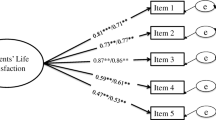Abstract
We demonstrate that people from Chinese cultural backgrounds have a smaller positive tendency in life evaluation compared to people in typical Western cultures. Participants first described their imagined best and worst life and then rated their current life on scale anchored by those imaginings (Mellor et al. International Journal of Social Research Methodology Theory and Practice, 2, 263–278, 1999), with scores above 50 indicating the strength of positive tendency. We compare responses from 82 Taiwanese students to data from the 22 Australian students in Mellor et al.’s (International Journal of Social Research Methodology Theory and Practice, 2, 263–278, 1999) study. Results of independent t tests support the hypothesis that culturally Chinese subjects have a lower positive tendency (65.32%SM) than Australian participants (76.12%SM) in life satisfaction evaluation.

Similar content being viewed by others
References
Chang, Y. H., & Fu, Y. C. (2002). Report of Taiwan social change survey IV-II (in Chinese). Taiwan: Academia Sinica.
Cummins, R. A. (1995). On the trail of the gold standard for subjective well-being. Social Indicators Research, 35, 179–200.
Cummins, R. A. (1998). The second approximation to an international standard for life satisfaction. Social Indicators Research, 43, 307–334.
Diener, E., & Diener, M. (1995). Cross-cultural correlates of life satisfaction and self-esteem. Journal of Personality and Social Psychology, 68, 653–663.
Diener, E., Suh, E., Smith, H., & Shao, L. (1995). National differences in reported subjective well-being: Why do they occur? Social Indicators Research, 34, 7–32.
Lee, Y., & Seligman, M. E. (1997). Are Americans more optimistic than the Chinese? Personality and Social Psychology Bulletin, 23, 32–40.
Legge, J. (1970). The works of Mencius (trans:) New York: Dover Publications.
Lu, L. (1998). The meaning, measure, and correlates of happiness among Chinese people. Proceedings of the National Science Council: Part C, 8, 115–137.
Lu, L., & Gilmour R. (2004). Culture and conceptions of happiness: Individual oriented and social oriented SWB. Journal of Happiness Studies, 5, 269–291.
Mellor D., Cummins R. A., Loquet C. (1999). The gold standard for life satisfaction: Confirmation and elaboration using an imaginary scale and qualitative interview. International Journal of Social Research Methodology Theory and Practice, 2, 263–278.
Mesquita, B., & Leu, J. (2007). The cultural psychology of emotions. In S. Kitayama & D. Cohen (Eds.), Handbook of cultural psychology (pp. 734–759). New York: Guilford Press.
Peng, K., & Nisbett, R. E. (1999). Culture, dialectics, and reasoning about contradiction. American Psychologist, 54, 741–754.
Spencer-Rodgers, J., Peng, K., Wang, L., & Hou, Y. (2004). Dialectical self-esteem and East–West differences in psychological well-being. Personality and Social Psychology Bulletin, 30, 1416–1432.
Tsai, J. L., Knutson B., & Fung H. H. (2006). Cultural variation in affect valuation. Journal of Personality and Social Psychology, 90, 288–307.
Yang, K. S., & Chiu, H. Y. (1993). Report of Taiwan social change survey I (in Chinese). Academia Sinica: Taiwan.
Author information
Authors and Affiliations
Corresponding author
Additional information
Shih-jung Lee and Chia-huei Wu have made equal contributions to this study.
Rights and permissions
About this article
Cite this article
Lee, Sj., Wu, Ch. Comparing the Level of Positive Tendency in a Life Satisfaction Evaluation between Chinese and Western People. Soc Indic Res 89, 147–153 (2008). https://doi.org/10.1007/s11205-007-9227-y
Received:
Accepted:
Published:
Issue Date:
DOI: https://doi.org/10.1007/s11205-007-9227-y




